八年级上册 单词巧记+句型语法剖析(Unit 1 How often do you exercise)
新目标英语八年级上册第一单元重点词汇、句型和语法
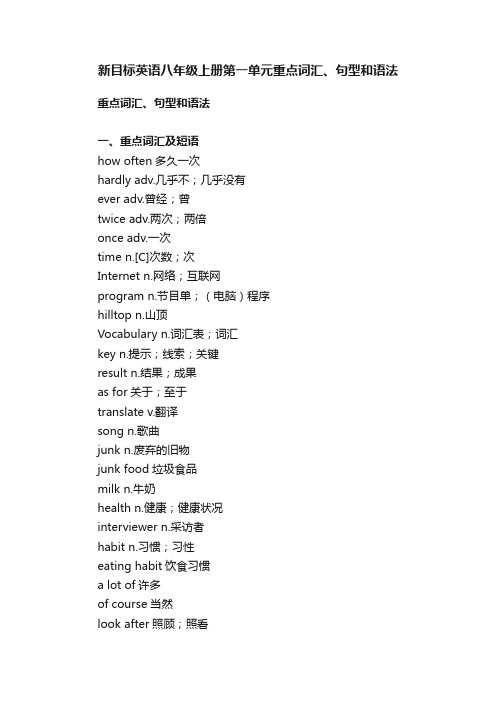
新目标英语八年级上册第一单元重点词汇、句型和语法重点词汇、句型和语法一、重点词汇及短语how often多久一次hardly adv.几乎不;几乎没有ever adv.曾经;曾twice adv.两次;两倍once adv.一次time n.[C]次数;次Internet n.网络;互联网program n.节目单;(电脑)程序hilltop n.山顶Vocabulary n.词汇表;词汇key n.提示;线索;关键result n.结果;成果as for关于;至于translate v.翻译song n.歌曲junk n.废弃的旧物junk food垃圾食品milk n.牛奶health n.健康;健康状况interviewer n.采访者habit n.习惯;习性eating habit饮食习惯a lot of许多of course当然look after照顾;照看difference n.不同;差异;区别make a difference使得结果不同;有重要性grade n.分数;年级;成绩unhealthy adj.不健康的;不益健康的yuck int.(表示反感、厌恶等)although=though conj.虽然;即使;纵然do表强调(位于实义动词前)skateboarding n.滑雪板运动start with以……开始二、重点句型和交际用语1.How often do you…?2.What do you usually do on weekends? I usually play soccer.What do they do on weekends? They often go to the movies.What does he do on weekends? He sometimes watches TV.How often do you shop? I shop once a month.How often does Chung watch TV? He watches TV twice a week.三、重要语法一般现在时的陈述句、特殊疑问句及其回答1.Some students do homework three or four times a week.2.A:How often do you watch TV?B:Twice a week.3.A:What does she do on weekends?B:She often goes to the movies.。
(完整版)八年级上册英语各单元知识点
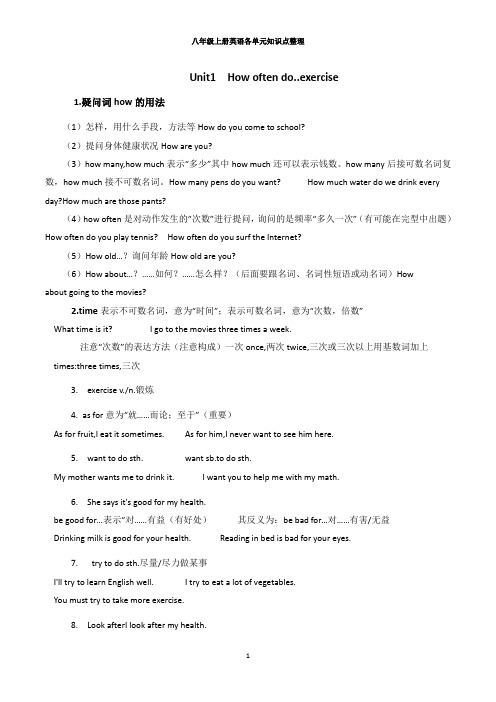
Unit1 How often do..exercise1.疑问词how的用法(1)怎样,用什么手段,方法等How do you come to school?(2)提问身体健康状况How are you?(3)how many,how much表示“多少”其中how much还可以表示钱数。
how many后接可数名词复数,how much接不可数名词。
How many pens do you want? How much water do we drink every day? H ow much are those pants?(4)how often是对动作发生的“次数”进行提问,询问的是频率“多久一次”(有可能在完型中出题)How often do you play tennis? How often do you surf the Internet?(5)How old…?询问年龄How old are you?(6)How about…?……如何?……怎么样?(后面要跟名词、名词性短语或动名词)Howabout going to the movies?2.time表示不可数名词,意为“时间”;表示可数名词,意为“次数,倍数”What time is it? I go to the movies three times a week.注意“次数”的表达方法(注意构成)一次once,两次twice,三次或三次以上用基数词加上times:three times,三次3. exercise v./n.锻炼4. as for意为“就……而论;至于”(重要)As for fruit,I eat it sometimes. As for him,I never want to see him here.5. want to do sth. want sb.to do sth.My mother wants me to drink it. I want you to help me with my math.6. She says it's good for my health.be good for…表示“对……有益(有好处)其反义为:be bad for…对……有害/无益Drinking milk is good for your health. Reading in bed is bad for your eyes.7. try to do sth.尽量/尽力做某事I'll try to learn English well. I try to eat a lot of vegetables.You must try to take more exercise.8. Look afterI look after my health.My brother is ill. I have to look after him today.He often helps his mother look after his little sister.9. help sb.(to)do sth.帮助某人做某事(to大多都是省略)My healthy lifestyle helps me get good grades. She often helps me learn math.10. the same as…与……一样Is her lifestyle the same as yours or different?She looks the same as her sister.11. I think I'm kind of unhealthy.kind of=a little有点儿(重要短语);a kind of一种12. although=thoughAlthough he's ill,he goes to school on time.13. keep in good health(重点掌握)=keep healthy=stay healthykeep+形容词表示保持某种状态A lot of vegetables help you to keep in good health.Keep quiet!The baby is sleeping. We must keep our classroom clean14. That sounds interesting.look(看起来),sound(听起来),smell(闻起来),taste(尝起来),feel(觉得),seem(好象),grow(变得),get(变得)等词在英语中可用作系动词,后跟形容词作表语。
八年级上册英语unit1单词及语法讲解
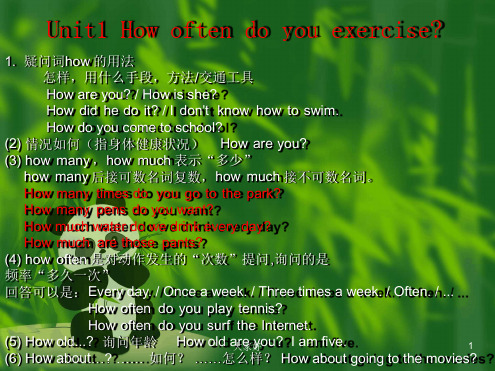
大家好
6
? 10. My healthy lifestyle helps me get good grades .
我健康的生活方式帮助我取得好的成绩。
help sb.(to) do sth. 帮助某人做某事
She often helps me learn math. 她经常帮助我学数学。
How often do you play tennis?
How often do you surf the Internet.
(5) How old...? 询问年龄 How old a大re家好you? I am five.
1
(6) How about…? …… 如何? ……怎么样? How about going to the movies?
I'll try to learn English well. 我会尽量尝试学好英语的。
You must try to take more exercise.
你必须尽量多做运动。
? 9. I look after my health. look after 照顾
My brother is ill. I have to look after him today.
How much water do we drink every day?
How much are those pants?
(4) how often 是对动作发生的“次数”提问 ,询问的是
频率“多久一次”
回答可以是:Every day. / Once a week. / Three times a week. / Often. / ...
There are many shops in the neighborhood. 4. as for 意为“就……而论”,“至于”
人教版八年级英语上册单元笔记_I_(Unit1-Unit6)

人教版八年级英语上册知识点总结Unit 1: How often do you exercise?【语言目标】会使用频率副词及短语;能描述课余时间的活动安排;会描述基本饮食结构。
1.how often”是一个特殊疑问词。
所谓的“频率”指的是某个动作多长时间/多久发生一次。
试比较:How often do you swim ?你多久游一次泳?How often does your father go to a movie?你爸爸多久看一次电影?针对“how often”引导的问句所进行的回答:twice a week, three times a month如always ,usually, often, sometimes, hardly ever, never.例:对划线部分提问:He always takes a bus to school. 注:划线部分都是对“频率”的描述,所以答案为How often does he take a bus to school?He never takes a bus to school.2.I always go shopping . Go +V-ing 表示“去xx”。
常见形式还有:go swimming,I often go skateboarding. go fishing,go walking...3.I can't stand shopping. 我无法忍受购物。
“意为:无法忍受xxx 。
特别注意:stand 后跟V-ing 形式。
对比复习介意xxx".例:Can you stand _______(hang) out with that silly boy?My father doesn't mind _______ (shop) this afternoon.4.]]],常用于句首,其后跟名词、代词或例:As for him,I never want to see him here. 至于他,我永远不希望在这里见到。
人教版八年级英语上册1-5单元知识点(词汇+句型+固定搭配)

Unit 1 Howoftendoyou exercise?词汇:1. howoften: 多久一次7.health: 健康,12. on weekends:在周末howmany:多少+可数名词healthy:健康的13. once a week:一周一次2.always(100%)-总是unhealthy: 不健康,twice a week:一周两次usually(80%) –通常keep/stay healthy three times a month: 一月三次often(60%)- 经常=keep/stay in good health: 保持健康14. most:大部分的,绝大多数的sometimes(40%)-有时候8.get good grades: 取得好成绩all:所有的hardly ever(20%)- 几乎不9.the same as:与…不同15.begood for:对…有益never(0%) 从不10. alot of= lots of: 大量,许多+ 可数/不可数名词be bad for: 对…有坏处3. surfthe internet: 上网alot =verymuch: 十分,非常,很1--6.how many:多少, +可数名词4.asfor: 至于,关于11. maybe:也许,大概how m uch: 多少,+不可数名词5. junk food: 垃圾食品maybe: 也许是,或许是(may是情态动词,be是动词原形)howmuch 多少钱,(问价格)6. look after=take care of:照顾12.little:小的,a littleboy: 一个小男孩17. of cou rse =sure 当然look for:寻找little: 少,little少→less更少→least最少(修饰不可数名词)look up:查找(单词、信息) little: 几乎没有,否定词(修饰不可数名词)look at: 看 a little:少许,有一点,肯定词(修饰不可数名词)few:几乎没有,否定词(修饰可数名词)a few少许,有一点,肯定词(修饰可数名词)句型:1.How often doyouexercise?→I exercise three timesa week.How often does sheshop?→Sheshops once amonth.2.What do you usually doon weekends?→I usually watchTV.How often doesshe watch TV? →She watchesTV everyday.3.Howmany hours do you sleepevery night? 你每晚睡几个小时?→Isleepnine hoursevery night.Howmany books do you have?你有多少本书?→I have5books.How muchis the sweater? 这件毛衣多少钱?--How muchwaterdoyou have? 你有多少水?(how much: 多少,后面+不可数名词, water是不可数名词)4.What’s your favorite program? 你最喜欢的电视节目是什么?→It’sAnimal World.固定搭配:try to do sth.: 尽力做某事,设法做某事try doingsth.: 试着做、尝试做某事help sb.(to) do sth: 帮助某人做某事(to可以省略)want sb. to do sth.: 想要某人做某事Unit 2 What’s thematter?词汇:1.have acold 感冒9.few:几乎没有,否定词(修饰可数名词)have a fever发烧 a few少许,有一点,肯定词(修饰不可数名词)have a stomachache肚子痛little: 几乎没有,否定词(修饰不可数名词)have a headache头疼a little: 少许,有一点,肯定词(修饰不可数名--词)have a toothache 牙齿疼10. at themoment= now 现在,此刻haveasorethroat 喉咙疼11. host family 寄宿家庭have a soreback 背部酸疼12. not…until…直到……时候才……2. lie downand have agood rest躺下好好休息13. should应该,情态动词,后+动词原形3.hot tea with honey加了蜂蜜的热茶should not=shouldn’t4.ill 病了的illness 疾病14. see a doctor 看医生5. advice建议(不可数名词) see a dentist 看牙医some advice(不能加”s”) 15.toomany太多…,修饰可数名词toomany students6.be stressed out 有压力的,紧张的too much太多…,修饰不可数名词too much yin7. balance 平衡balanced 平衡的much too太……,much too big太大abalanced diet平衡的饮食16. stay=keep 保持on a diet 节食keep/stay healthy8.get 变得=keep/stayin good health: 保持健康get angry变得生气get tired 变得劳累句型:1.What’s the matter with you? = What’s the trouble with you? =What’s wrong with you? 你怎么了?→Ihavea cold/ havea toothache/ have asore throat….2.Wha t’s thematter? →She hasa cold.--3. Doeshehave acold? →Yes, he does.4. A: What’s the matter?B: I’m not feeling well.(此处不能用good)I have a cold.A:When did it start?B:About two days ago.A: That’stoo bad.You shoulddrinklotsof water.B:Yes, Ithink so.A:Ihopeyou feel/getbetter soon. 我希望你尽快好起来5. A: I have a coldB: Iam sorry tohear that.(当听到对方不好的消息时使用此句)固定搭配:Itis+ 形容词+ (for sb.) todo sth.做某事对某人来说是………的例句: It is easyforme to learn(learn)English. 对我来说学英语是容易的Itis interesting to watch (watch) Animal World.看动物世界时有趣的Unit 3 What are youdoingfor vacation?→→→本单元用现在进行时态表示将来的事情现在进行时态,即be+doing:--词汇:1.go camping去野营 6. a lot = very much 十分、非常、很 2. A: What ar eyoudoing forvacation?go fishing 去钓鱼alot of=lots of许多、大量B: Iam g oing camping.go shopping去购物7. away向远处、离开A:That sounds nice.go swimming 去游泳goaway离开Who are you going with?go hiking 去远足B: I am going withmy parents.go bike riding去骑单车8.stay: 留、停留、呆go sightseeing去观光旅游 3. Linda is goingto Tibetnext summer.(划线提问)2. how long 多久、多长时间句型:→Where is Linda goingnextsummer?3. getback 回来getbacktoschool 1. What are you doingforvacation? 4.He’s going on the 12th.(划线提问)4. befamous for…以……而闻名→I amvisitingmygrandparents. →Whenishe--going?5. leavefor…离开去……地方Whatisyourbrotherdoing for vacation?leave →(过去式)left→Heisgoingcamping. 5.I’m staying there for a week.(划线提问)left:左边、离开→How long areyou staying?6.当听到对方提出的建议,如:What about playingbasketball?Howabout taking a walk withme? Why not goto the movie? 为什么不去看电影? I am going camping.等句子时,回答可用以下句型:That soundsnice/ good/interesting/.That’sa good idea./ Good idea.Thatsounds like a good ide a./Great等.7.当听到对方要去旅行或是准备出行时,如:I am going to Hongkong foraweek. I am goinghiking inthe mountains.时,回答一般用以下句型:Have a good time!8.询问天气: How isthe weather? 或是What’s the weather like?9.询问某人的职业:What do youdo?Whatareyou?What’s your job?你的工作是什么?What does yourmotherdo? What ishe?他是干什么的?10.询问某人的性格:What areyoulike? →Iam outgoing/shy/ quiet.Whatis he like? 他是个什么样的人?→Heis outgoing/ shy/ quiet. 他很外向/害羞/安静10.询问某人长的什么样子:What does he look like?他长的什么样子?→Heisofmediumbuild/height.他--中等身材/身高.What does yourfather look like?→Heis tall.他很高11. 询问某人喜欢什么:What do youlike?你喜欢什么? →I like basketball. 我喜欢篮球固定搭配:1.finish doingsth 完成做某件事例:Ifinished doing my homework.我完成了我的家庭作业Unit1-3 单元课本语法知识&在讲解畅优新课堂时补充的语法知识点与固定搭配:1.情态动词后+动词原形(do)已学情态动词:can 能够, must必须, should 应该, may 也许.would 想,会help sb(to) do sth帮助某人做某事2. 介词后若接动词,则接动词的ing形式:常见的:what about + doingsth? 做………怎么样?常接doing的固定搭配:1. like doing sth 喜欢做某事2. enjoy doingsth享受做某事3. have a good/havefunin doing sth做某事玩的很开心4. finish doing sth完成做某件事5.spend +(时间、金钱、精力)doing sth花时间、金钱、精力做某事--= spend +(时间、金钱、精力) on sth3.不定式,即:to do常接不定式的固定搭配:want sb to do sth 想要某人做某事would like to dosth想做某事tell sb to do sth 告诉某人做某事asksb to do sth要求某人做某事plan to do sth计划做某事decideto do sth决定做某事need todo sth 需要做某事forget to do sth忘记做某事tryto dosth 尽力做某事4. 不定代词+ 形容词结构例:something interesting 一些有趣的事情Unit 4 How do youget to school?词汇:1.get to: 到达arriveat:到达+小地点(学校、医院…)arrive in: 到达+大地点(城市、国家、地区…)reach: 到达2. take the bus= by bus:坐公交车8.howlong: 多久,how far:多远13. take…to…把…带到…3. take the train =by train: 坐火车9.from…to…从…到…14. from: 离…的距离4.take the subway = by subway:坐地铁10. thinkof: 认为thinkabout: 考虑15. not all: 不--是所有5. ride one’sbike = bybike:骑单车11. around theworld =allover the world: 全世界6.walk=on foot:走路12.be different from:与…不同16. more…than…:比…更…, than:比7. depend on:视……而定,决定于……,依靠……17.other 其他的,形容词18. than比others其他的人或其他的事19. more…than…比……更……,形容词比较级的用法the other两者中的另一个,单数概念theothers两部分中的另一部分,复数概念another 另外一个,另外的,第三个的句型:1. How do you getto school?→Itake the bus./ Igoto schoolbybus.How does she getto school? →She takes the bus./ She goes to school bybus.2. How long does it take?→It takesabout/around 10 minutes. →Ittakesabout25minutesto walk and 10 minutes by bus.How long doesittake youtoget from hometo school? →It takes25minutes.3. How far is itfrom your home to school? →It’s 3 miles./10 kilometers.4. Whatdo youthinkof………? = how doyou like……?你认为……怎么样?--5. Howfardo you live fromschool?你住的离学校有多远→I live 10milesfromschool.6. CanI help you? May I helpyou?→Yes,please.固定搭配:1.It takes sb.+ 时间+ to do sth. 例句:It takesme20 minutesto walk (walk)2.need todo sth.需要做某事3.more…than…比……更……,形容词比较级的用法4形容词的比较级&最高级:规则变化:比较级:形容词尾+“er”,最高级:+“est ”,例:big →bigger→the biggest不规则变化:三个音节及以上的形容词(比较长的形容词),比较级:前面+ more,最高级:前面+most,例:popular 流行的→more popular更流行的→themost popular最流行的最高级前面+“the”例:This classroom isbiggerthan that one.这件教室比那间大This classroom is thebiggest. 这间教室是最大的Unit5Can you come to my party?词汇:1. other 其他的The other 另一个(两个中的另一个)9.have to 不得不,要…The others另一部分(两部分中的另一部分) 10. babysit=look after=take care of = carefor 关心,照顾Another 另外的,另一个(三个以上中的另一个)--2.the daybefore yesterday前天句型:yesterday 昨天 1. Can you come to my party?today 今天Yes, I’d love to.(肯定回答)tomorrow 明天I’m sorry,Ican’t. I have to……(否定回答) theday after tomorrow 后天 2. What’s today? 今天星期几,几号?(星期、日期都可以问)3. onweekends在周末It’s Mondaythe 14th. 今天14号星期一。
八年级英语上册1-4单元知识点总结
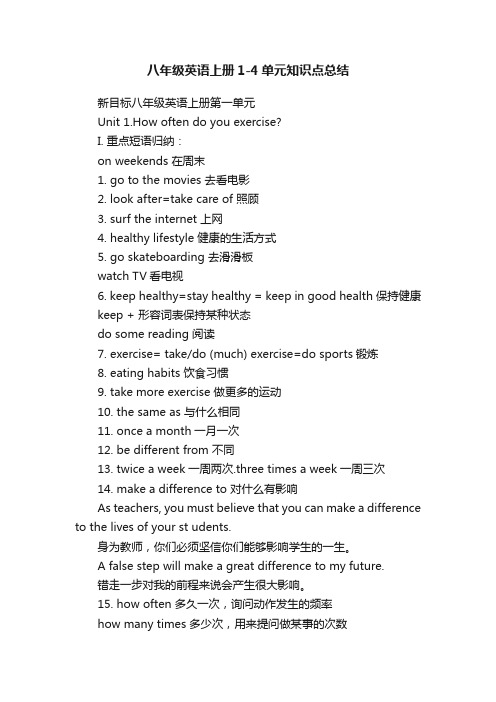
八年级英语上册1-4单元知识点总结新目标八年级英语上册第一单元Unit 1.How often do you exercise?I. 重点短语归纳:on weekends 在周末1. go to the movies 去看电影2. look after=take care of 照顾3. surf the internet 上网4. healthy lifestyle 健康的生活方式5. go skateboarding 去滑滑板watch TV看电视6. keep healthy=stay healthy = keep in good health 保持健康keep + 形容词表保持某种状态do some reading 阅读7. exercise= take/do (much) exercise=do sports锻炼8. eating habits 饮食习惯9. take more exercise 做更多的运动10. the same as 与什么相同11. once a month一月一次12. be different from 不同13. twice a week一周两次.three times a week一周三次14. make a difference to 对什么有影响As teachers, you must believe that you can make a difference to the lives of your st udents.身为教师,你们必须坚信你们能够影响学生的一生。
A false step will make a great difference to my future.错走一步对我的前程来说会产生很大影响。
15. how often 多久一次,询问动作发生的频率how many times 多少次,用来提问做某事的次数16. although=though虽然 <不能与but连用>Although he is old, he is quite strong.(He is old, but he is quite strong.)句子中,有although或though就不可再用but,但可用yet或still“仍然,还”;有because就不能再用so.17. most of the students=most students大多数学生18. shop=go shopping=do some shopping 购物19. as for至于20. activity survey活动调查21. do homework做家庭作业22. do house work做家务事23. eat less meat吃更少的肉24. junk food垃圾食物25. be good for 对什么有益26. be bad for对什么有害27. want to do sth 想做某事28. want sb to do sth想某人做某事29. try to do sth 尽量做某事30. come home from school放学回家31. of course=certainly=sure当然32. get good grades取得好成绩33. some advice 一些建议some advice 中的advice 是不可数名词 a piece of advice 一则建议 give advice 提出建议take one’s advice 采纳或听从某人的建议4. help sb to do sth帮助某人做某事=help sb with sth35. a lot of vegetables=many vegetables许多蔬菜36. hardly= almost not几乎不 hardly ever很少,几乎不,从不37. keep/be in good health保持健康38.your favorite program你最喜欢的节目39. Animal World 动物世界40. play soccer踢足球41.every day 每天every day 与 everyday1. every day 作状语,译为“每一天”。
八年级英语上册《Unit 1 How often do you exercise》重点短语及句子 人教新目标版
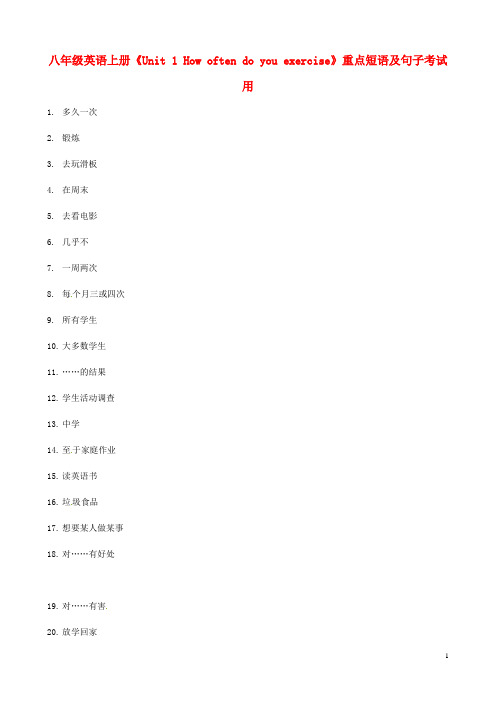
八年级英语上册《Unit 1 How often do you exercise》重点短语及句子考试
用
1.多久一次
2.锻炼
3.去玩滑板
4.在周末
5.去看电影
6.几乎不
7.一周两次
8.每个月三或四次
9.所有学生
10.大多数学生
11.……的结果
12.学生活动调查
13.中学
14.至于家庭作业
15.读英语书
16.垃圾食品
17.想要某人做某事
18.对……有好处
19.对……有害
20.放学回家
21.饮食习惯
22.当然、自然
23.照顾、照看
24.尽力做某事
1.你多久锻炼一次?
2.她周末通常干什么?
3.下面是格林中学学生活动调查结果。
4.我妈妈想让我喝牛奶。
5.我每天都锻炼,通常是在我放学回家的时候。
6.我的饮食习惯非常好。
7.这本书与那本书相同。
8.这本是与那本书不同。
9.她可能在学校呢。
10.虽然他很小,但他懂的很多。
11.我健康的生活方式帮助我取得好成绩。
、
12.多吃蔬菜对我们的健康有好处。
【英语】八级上册教材全梳理(UnitHowoftendoyouexercise)

【英语】八年级上册教材全梳理(Unit 1How often do you exercise)知识∙巧学∙升华巧解生词【词析】音析:字母组合ar发。
形析:hard (难的)+-ly(副词后缀)【例句】 Mary is hardly ever late.玛丽几乎从不迟到。
【拓展】(1)在反意疑问句中,含有hardly的句子为否定语气,所以后面的疑问部分用肯定语气。
(2)当hardly用于句首作状语时,要用倒装语序。
如:Hardly had we got into the country when it began torain.我们刚到乡间就开始下雨了。
【词析】音析:字母组合er发。
形析:形近词 never(从不)【例句】 He is ever ready to help others.他是一个活雷锋。
【拓展】(1)多用于否定句、疑问句、条件状语从句中,相当于at any time,如:Have you ever climbed a mountain? 你爬过山吗?(2)ever用于书信末尾的客套语中,如:Yours ever …你永远的……【词析】音析:i在相对开音节中发[aI]。
形析:形近词twin(双胞胎)【例句】 Twice two is four. 二二得四。
【拓展】(1)表示倍数,如:This room is twice as large as that one.这间屋子比那间大一倍。
(2)表示频率,如:He goes to Shanghai twice a year.他一年去两次上海。
【例句】 I go to see a film once a week.我每周看一场电影。
【拓展】(1)常用的表达法,用于讲故事,相当于long long ago。
(2)常用短语:once a day 一天一次【词析】音析:i在相对开音节中发[aI]。
【例句】 I’ve been to Beijing three times. 我去过北京三次。
八上Unit 1 How often do you exercise讲解
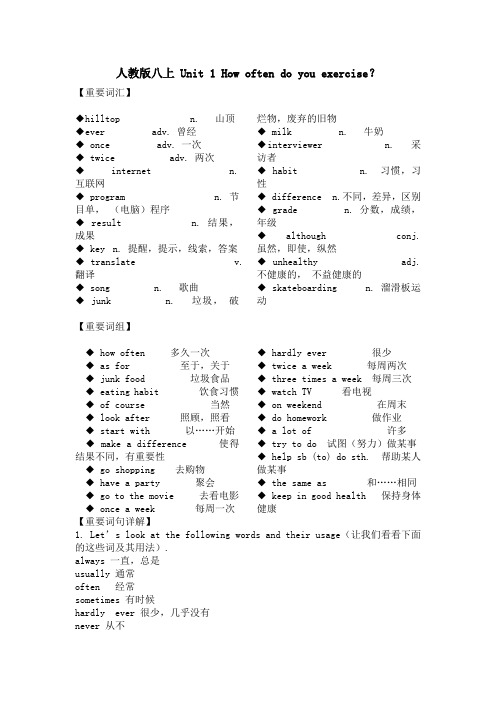
人教版八上 Unit 1 How often do you exercise?【重要词汇】◆hilltop n. 山顶◆ever adv. 曾经◆ once adv. 一次◆ twice adv. 两次◆internet n. 互联网◆ program n. 节目单,(电脑)程序◆ result n. 结果,成果◆ key n. 提醒,提示,线索,答案◆ translate v. 翻译◆ song n. 歌曲◆ junk n. 垃圾,破烂物,废弃的旧物◆ milk n. 牛奶◆interviewer n. 采访者◆ habit n. 习惯,习性◆ difference n.不同,差异,区别◆ grade n. 分数,成绩,年级◆although conj. 虽然,即使,纵然◆ unhealthy adj. 不健康的,不益健康的◆ skateboarding n. 溜滑板运动【重要词组】◆ how often 多久一次◆ as for 至于,关于◆ junk food 垃圾食品◆ eating habit 饮食习惯◆ of course 当然◆ look after 照顾,照看◆ start with 以……开始◆ make a difference 使得结果不同,有重要性◆ go shopping 去购物◆ have a party 聚会◆ go to the movie 去看电影◆ once a week 每周一次◆ hardly ever 很少◆ twice a week 每周两次◆ three times a week 每周三次◆ watch TV 看电视◆ on weekend 在周末◆ do homework 做作业◆ a lot of 许多◆ try to do 试图(努力)做某事◆ help sb (to) do sth. 帮助某人做某事◆ the same as 和……相同◆ keep in good health 保持身体健康【重要词句详解】1. Let’s look at the following words and their usage(让我们看看下面的这些词及其用法).always 一直,总是usually 通常often 经常sometimes 有时候hardly ever 很少,几乎没有never 从不这些词都是表示频率的副词, 但是在程度上有差别。
初二英语上Unit 1知识重点 How often do you exercise

Unit 1 How often do you exercise? Section A1.How often 多久一次,用来提问在某一段时间内进行某个动作的次数2.Go skating/shopping/fishing/boating/swimming3.Every other day 每隔一天4.always sually often sometimes hardly ever never总是通常经常有时几乎不绝不,从不100% 80% 30%-50% 20% 5%seldom很少almost never sometime (过去或将来)某个时候some time一段时间some times 几次,几倍once/twice/基数词+timess + 一段时间. 表“多少时间几次”eg.once a week / twice a month / five times a year5.on weekends = every weekend每逢周末on the weekend = at the weekend 在周末6.go to the movies = see a movie= go to the cinema去看电影watch 仔细地,有目的和特意的“看”,表“注视,观看”see 强调看的结果look 多用来唤起别人的注意,强调看的动作,look at+宾语read看书,看报7.surf the Internet 网上冲浪,上网Go surfing 去冲浪8. eye exercise 眼保健操bodybuilding 健美操hip-hop 街舞yoga 瑜伽9. no students=don’t have students10. here + be动词,“这里有……”11.here + be动词这里有……(倒装)12.some . pron.有些人/事,数量不确切时用most of + n.(pl.)/u.n/人称代词宾格eg. Most/some of us go to school by bikeMost of the water is dirty13.as for 至于,关于14.the result for 至于……的结果是……the result of + n.…….表“……的结果’15. interesting 修饰物.做定语、表语interested 修饰人.“感兴趣的”.be ~ in 对……感兴趣v-ing.令人感到……v-ed.(人)觉得/感到……boring/bored exciting/excited suprising/surprisedSection B1.want/would like sb (not) to do sth. 想要某人(不要)做某事want/would like sb not to do sth..某人不要做某事want to do sth. 想要做某事2.be good/bad for 对……有好/害处,对……有益/害be good at (doing sth) 擅长= do well inbe good to 对待……友好be good with 善于处事/待人3.how many + 可数名词复数,“有多少”how much + 不可数名词,“有多少,多少钱”4.sleep = go to sleep/bed5.pretty .adv.=quite 相当地adj. 漂亮的,可爱的,多用于女性或小孩,形容娇小可爱之意6.try. V. try (not) to do sth 尽力干某事try doing sth 尝试干某事try one’s best to do sth 尽某人最大努力干某事7. a lot of = lots of 既可接可数名词复数,也可接不可数名词a lot. adv.= very much,非常,位于句末eg. I like bananas a lot (very much).8.see.v.= understand9.look after = take care of照顾,照看look at 看look for 寻找look out = watch out 注意。
人教版英语八年级上册单词巧记句型语法剖析(Unit1Howoftendoyouexercise)

初中英语学习材料madeofjingetieji八年级上册单词巧记+句型语法剖析Unit 1How often do you exercise三点剖析单词·巧记·典句·考点hardly []adv.几乎不;几乎没有【巧记提示】hard(坚硬的,困难的)+-ly(副词后缀)【经典例句】Hardly几乎没有人来。
【考点聚焦】1)注意在反意疑问句中的特殊用法。
如:She hardly eats anything,does she?她几乎什么都不吃,是吗?2)与hard的区别。
试比较:Study hard,and you’ll succeed.努力学习,你就会成功。
She hardly studies,so she fails in the exam.她从不学习,因此考试不及格。
3)注意hardly在句子中的位置。
放在主语之后,实义动词之前。
【活学活用】1.请给出同样的构词法得来的词,越多越好。
答案:carefully,quickly,quietly,slowlyever []adv曾;曾经【巧记提示】ever→never(决不【经典例句】He is ever ready to help others.他是一个活雷锋。
【考点聚焦】1)多用于否定句、疑问句、条件状语从句中,相当于at any time。
2)注意其在句子中的位置。
放在主语之后,实义动词之前。
3)在书信末尾亲切并且不拘礼的表达:如:Yours ever 你永远的……twice []a dv.两次;两倍【巧记提示】twice→twin(使成对【经典例句】Twice二二得四。
【考点聚焦】1)twice表示“两次”时,不和time连用。
2)在表示“一两次”时,要用or连接。
即:3)还可以用来表示倍数。
【活学活用】2.1)译句子我学习比你努力一倍。
2)对画线部分提问He goes to the cinema twice a month.答案:2)How often does he go to the cinema?once []adv.一次【巧记提示】once→one(一个),一次一个人【经典例句】I go to see a film once我每周看一场电影。
八年级上册英语笔记

Unit1 How often do you exercise?Section ALange Goal: Talk about how often you do thing .标题释义:知识点 1. how often 的用法:1)how often 是“多久一次”的意思,常用频率副词(always, usually, often, sometimes, hardly ever, never), once a week , two or three times a month ,every day等词来回答。
如果对这些词划线部分提问,则用how often.2)how often 的同义词组是how many times (多少次),所以问句的同义句句是:How many times do you exercise ?3)但是how many times 与how often 的区别是how many times 通常只用once, twice, three times 等来回答。
eg. How often does she go to the movies ?------- Twice a monthHow many times do you watch TV every week ?------- Three times.4)补充:how long 是“多长时间”的意思,回答常用“for…”或”since …”引导的时间状语。
Eg. How long have you been in America ?“他在美国多久了”------- For two years .“两年了”how soon 是“还要多久才…”的意思,一般用将来时态,回答用“in …”引导的时间状语。
eg . How sooon will he be back ? “他多久回来“------- He will be back in an hours . “他一小时后回来”how much 也意为“多少”,但后面跟不可数名词,也对数量提问;同时还可用来询问价格“多少钱”的意思。
英语:unit 1《how often do you exercise》句型汇总(人教新目标八年级上).doc

英语:Unit 1《How often do you exercise》句型汇总(人教新目标八年级上)你多久运动一次?1.她每月上一次网。
3.他弟弟几乎不玩滑板。
4.我妈妈每周看两次她最喜欢的节目。
5.请看格林高中学生活动调查的结果。
6.对于作业来说,没有一个学生每周做2-3次作业的。
7.当然了,喝牛奶对我的身体有好处。
8.你每天夜晚睡多少个小时?9.我们尽力照顾好采访者们。
10.也许,我健康的生活方式帮助我拿到好分数。
11.虽然我的饮食习惯不健康,但是我学习地更好。
12.当你少吃巧克力的时候,你就可以保持好的身体状况。
13.美国的鞋子和中国的鞋子一样,但是美国的价格和中国的价格不一样。
14.和。
一样15.和。
不同16.某人身体好17.保持健康18. 想让某人做某事19. 做某事对某人有好处某人有帮助1. How often do you exercise?2. She surfs the Internet once a month.3. His brother hardly ever skateboards.4. My mother watches her favorite program twice a week.5. Here are the results of the student activity survey at Green High School.6. As for homework, no students do homework two or three times a week.7.Of course, it is good for my health to drink milk.8.How many hours dou you sleep every night?9.We try to look after the interviewers.10.Maybe my healthy lifestyle helps me get good grades.11.Although my eating habits are unhealthy, I study better.12.When you eat less chocolate, you can keep in good health.13.The shoes in America are the same as the shoes in China, but the prices are different from the prices in China.14. be the same as15. be different from16. be healthy = be in good health17. keep healthy = keep in good health18. want sb to do sth19. It is good for sb to do sthbe helpful to sb。
八年级上册第一单元Unit 1 How often do you exercise

Unit 1 How often do you exercise?一、重点单词:exercisehardlyeverInternetresultdrinkhealth healthy unhealthyhabitdifferent differencealthough thoughkeepmay be & maybe二、重点短语:how oftenas forlook aftera lot of = lot's ofthe result forthe same as*词组扩展1. go to the movies 去看电影2. look after=take care of 照顾3. surf the internet 上网4. healthy lifestyle 健康的生活方式5. go skate boarding 去划板6. keep healthy=stay healthy 保持健康7. exercise=take (much) exercise=do sports锻炼8. eating habits 饮食习惯9. take more exercise 做更多的运动10. the same as 与什么相同11. once a month一月一次12. be different from 不同13. twice a week一周两次14. make a difference to 对什么有影响15. how often 多久一次16. although=though虽然17. most of the students=most students大多数学生18. shop=go shopping=do some shopping 购物19. as for至于20. activity survey活动调查21. do homework做家庭作业22. do house work做家务事23. eat less meat吃更少的肉24. junk food垃圾食物25. be good for 对什么有益26. be bad for对什么有害27. want to do sth 想做某事28. want sb to do sth想某人做某事29. try to do sth 尽量做某事30. come home from school放学回家31. of course=certainly=sure当然32. get good grades取得好成绩33. some advice34. help sb to do sth帮助某人做某事=help sb with sth35. a lot of vegetables=many vegetables许多蔬菜36. hardly=not nearly / almost not几乎不37. keep/be in good health保持健康三、语法点:1、特殊疑问句2、频度副词四、句型1. How often do you exercise? 你(你们)多久锻炼一次身体?How often + 助动词do(does或did) + 主语+ do sth.? 疑问词how often是问频率(多久一次),(在这里助动词do/does/did是起帮助构成疑问的作用)与一般现在时或一般过去时连用,回答一般是用表示频率的副词,如:once, twice, three times…, sometim es, often, quite, often, never, every day, once a week , twice a month , three times a month , three or four times a month 等。
人教版八年级英语上册语法点总结(最全面)

八年级上册语法点总结Unit 1 How often do you exercise?Grammar: 特殊疑问句:wh—questions:what, who,where, when, which,whose,why,whom等.特殊疑问句的构成及用法:1.结构:特殊疑问词+ 一般疑问句, 即:特殊疑问词+be/助动词/情态动词+主语+谓语/表语(+其他)疑问代词:1)Who:谁。
做主语,用来指人Who is the boy under the tree?2)Whom 谁,做宾语,用来指人Whom are you writing to?3) Whose 谁的,用来指所属关系,如果做定语,一般后接名词Whose pen is this?4)Which 哪个,哪些,用来指对人或物在一定范围之内进行选择Which grils will in the sports meeting? Which pen is Lily’s?5)What什么,通常指物,也可指人,一般用在没有指出范围的情况下What can you see in the picture?What are you doing now?疑问副词:1)When:何时,询问时间When will she come back?2)Where何地,询问地点, Where do you come from?3)Why为什么,询问原因, Why are you late for school?4)How 如何,询问手段、方式、工具以及程度等How do you usually go to school?5)How old多大,询问年龄,How old is Jim’s little brother?6)How many/much多少,询问数量How many birds are there in the tree?7)How far多远,询问距离,How far is it form your home to school?8)How long多长,多久,询问时间的长度或距离How long will you stay in Beijing?9)How often多长时间按一次,询问频率How often do you go to see your grandparents?10)How soon多久,询问时间How soon will you come back?频率副词:表示动作发生的频率,never, sometimes,often, usually, always.Unit 2 What's the matter with you?Grammar:1. 用have 来描述身体不适have/have got a +疾病名字;得了……病2.情态动词should,情态动词should,can, may, must没有人称和时态的变化,后接动词原形Unit 3 What are you doing for vacation?Grammar:现在进行时表将来一般将来时表示将要做某事或计划打算做某事要用到句型“be+doing”其中be是助动词,它有人称和单复数的变化。
英语素材:Unit 1 How often do you exercise知识点总结人教新目标八年级上

Unit 1 How often do you exercise1.What do you usually do on weekends? 你周末常常做什么?(1)这是一个由疑问词what引导的特殊疑问句。
前一个do为助动词,构成疑问句结构,后一个do为实义动词(或叫行为动词),意思是“做;干”。
注意:助动词do要随着主语的人称、时态和数的不同作出相应的变化。
如:▲What does she do on weekends?周末她做什么?(2)usually为频率副词,意思是“通常;经常”,与often意思相近,但程度有别。
【辨析】:频率副词always, usually, often, sometimes, hardly ever, never【拓展】频率副词always的用法:在所有的频率副词中,always语气最强,表示“总是;永远”。
①always可用于进行时态,表示“老是;总是”,是一种加强语气的说法,含有“气愤;不满;不耐烦;赞赏”等感情色彩。
如:▲ He is always coming late. 他总是迟到。
(埋怨)▲ He is always helping others. 他总是帮助别人。
(赞扬)②always通常放在be动词后面,行为动词前面,一般不放在句首。
但为了强调或在祈使句中,也可放在句首或放在整个谓语前面,有时甚至置于句末。
如:▲ Always pay attention to your pronunciation. 要始终注意发音。
③always与not连用时,表示部分否定,意思是“不一定总是;未必”等。
如:▲ Honesty is not always the best policy. 诚实未必永远是上策。
(3)on weekends 意思是“在周末”,也可说成at (the) weekends, 此处的weekends指星期六和星期日。
2.—How often do you watch TV? 你多久看一次电视?—Twice a week. 一周两次。
八年级英语上册个单元知识的总结
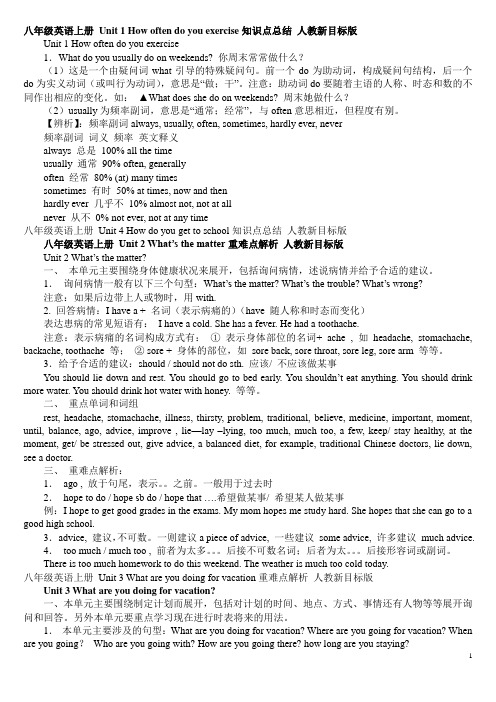
八年级英语上册Unit 1 How often do you exercise知识点总结人教新目标版Unit 1 How often do you exercise1.What do you usually do on weekends? 你周末常常做什么?(1)这是一个由疑问词what引导的特殊疑问句。
前一个do为助动词,构成疑问句结构,后一个do为实义动词(或叫行为动词),意思是―做;干‖。
注意:助动词do要随着主语的人称、时态和数的不同作出相应的变化。
如:▲What does she do on weekends? 周末她做什么?(2)usually为频率副词,意思是―通常;经常‖,与often意思相近,但程度有别。
【辨析】:频率副词always, usually, often, sometimes, hardly ever, never频率副词词义频率英文释义always 总是100% all the timeusually 通常90% often, generallyoften 经常80% (at) many timessometimes 有时50% at times, now and thenhardly ever 几乎不10% almost not, not at allnever 从不0% not ever, not at any time八年级英语上册Unit 4 How do you get to school知识点总结人教新目标版八年级英语上册Unit 2 What’s the matter重难点解析人教新目标版Unit 2 What‘s the matter?一、本单元主要围绕身体健康状况来展开,包括询问病情,述说病情并给予合适的建议。
1.询问病情一般有以下三个句型:What‘s the matter? What‘s the trouble? What‘s wrong?注意:如果后边带上人或物时,用with.2. 回答病情:I have a + 名词(表示病痛的)(have 随人称和时态而变化)表达患病的常见短语有:I have a cold. She has a fever. He had a toothache.注意:表示病痛的名词构成方式有:①表示身体部位的名词+ ache , 如headache, stomachache, backache, toothache 等;② sore + 身体的部位,如sore back, sore throat, sore leg, sore arm 等等。
八上前两单元单词带注解
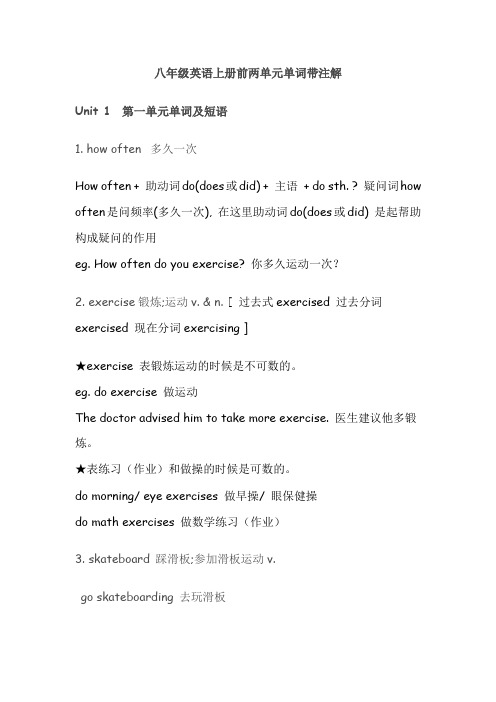
八年级英语上册前两单元单词带注解Unit 1 第一单元单词及短语1. how often 多久一次How often + 助动词do(does或did) + 主语+ do sth. ? 疑问词how often是问频率(多久一次), 在这里助动词do(does或did) 是起帮助构成疑问的作用eg. How often do you exercise? 你多久运动一次?2. exercise锻炼;运动v. & n. [过去式exercised 过去分词exercised 现在分词exercising ]★exercise 表锻炼运动的时候是不可数的。
eg. do exercise 做运动The doctor advised him to take more exercise. 医生建议他多锻炼。
★表练习(作业)和做操的时候是可数的。
do morning/ eye exercises 做早操/ 眼保健操do math exercises 做数学练习(作业)3. skateboard 踩滑板;参加滑板运动v.go skateboarding 去玩滑板4. hardly 几乎不;几乎没有adv.5. ever 曾;曾经adv.hardly ever 几乎不,几乎从不I think I'm kind of unhealthy. I hardly ever exercise.我认为我有点不健康,我几乎从不锻炼身体6. shop 购物v.7. once 一次;曾经adv.I lose one at least once a month. 我一个月至少会丢掉一个。
I once interviewed him for a job. 我曾经为一份工作面试过他。
8. twice 两次; 两倍adv.Did you do it twice or three times? 这件事你做了两次还是三次?9. time 次;次数(可数)n.- How many times did you go to Shanghai? - Three times. 你去过上海几次?三次。
- 1、下载文档前请自行甄别文档内容的完整性,平台不提供额外的编辑、内容补充、找答案等附加服务。
- 2、"仅部分预览"的文档,不可在线预览部分如存在完整性等问题,可反馈申请退款(可完整预览的文档不适用该条件!)。
- 3、如文档侵犯您的权益,请联系客服反馈,我们会尽快为您处理(人工客服工作时间:9:00-18:30)。
八年级上册单词巧记+句型语法剖析Unit 1How often do you exercise三点剖析单词·巧记·典句·考点hardly []adv.几乎不;几乎没有【巧记提示】hard(坚硬的,困难的)+-ly(副词后缀)【经典例句】Hardly anybody came. 几乎没有人来。
【考点聚焦】1)注意在反意疑问句中的特殊用法。
如:She hardly eats anything,does she?她几乎什么都不吃,是吗?2)与hard的区别。
试比较:Study hard,and you’ll succeed.努力学习,你就会成功。
She hardly studies,so she fails in the exam.她从不学习,因此考试不及格。
3)注意hardly在句子中的位置。
放在主语之后,实义动词之前。
【活学活用】1.请给出同样的构词法得来的词,越多越好。
答案:carefully,quickly,quietly,slowlyever []adv. 曾;曾经【巧记提示】ever→never(决不)【经典例句】He is ever ready to help others.他是一个活雷锋。
【考点聚焦】1)多用于否定句、疑问句、条件状语从句中,相当于at any time。
2)注意其在句子中的位置。
放在主语之后,实义动词之前。
3)在书信末尾亲切并且不拘礼的表达:如: Yours ever 你永远的……twice []a dv. 两次;两倍【巧记提示】twice→twin(使成对)【经典例句】Twice two is four. 二二得四。
【考点聚焦】1)twice表示“两次”时,不和time连用。
2)在表示“一两次”时,要用or连接。
即:once or twice 3)还可以用来表示倍数。
【活学活用】2.1)译句子 我学习比你努力一倍。
2)对画线部分提问 He goes to the cinema t wice a month.once []adv.一次【巧记提示】once→one(一个),一次一个人【经典例句】I go to see a film once a week. 我每周看一场电影。
【考点聚焦】1)常用于讲故事,相当于long long ago。
2)表频率。
如:once a year,once a week,once a month3)常见的短语有at once 立刻;once again再一次。
【活学活用】3.选择—How often do you go home?— . A.One a week B.Once C.One D.Once a weekhealth []n. 健康;健康状况【巧记提示】heal (冶愈) v.+-th(名词后缀)【经典例句】Health is better than wealth. 健康胜于财富。
【考点聚焦】1)同根词:healthy adj. 健康的;healthily adv.健康地2)相关的短语:be in good/poor health身体好(不好);drink sb.’s health举杯祝某人健康【活学活用】4.(2010淄博模拟模拟) 根据首字母补全单词You must learn to eat h and take exercise regularly.difference []n.不同;区别;差异【巧记提示】differ(不同)+-ence(名词后缀)经典例句There are many differences among brothers and sisters. 一母有百子,个个都不同。
【考点聚焦】1)它的形容词为different;2) difference 是可数名词。
【活学活用】5.选择Is her lifestyle the same as yours or ? What are the ?A.difference;differentB.different;differenceC.different;differencesunhealthy []adj.不健康的;不益于健康的【巧记提示】un-(否定前缀)+healthy(健康的)【经典例句】I think I’m kind of unhealthy. 我想我就属于不健康类的人。
【考点聚焦】1)反义词healthy 2)常作定语,如:I have an unhealthy habit.3)注意加前缀un 变否定形式的词。
如:unusual,unkind【活学活用】6.翻译句子我的不健康的生活方式导致我的成绩糟糕。
although []conj. 虽然;即使;纵然【巧记提示】al+though(虽然)【经典例句】They are generous although they are poor. 尽管他们穷,却很慷慨大方。
【考点聚焦】1)although,though区别小,though用于非正式语体中。
2)当句中有but时,就不能再用although 或though。
【活学活用】7.1)翻译句子虽然他身体不好,但他努力工作。
2)选择it is rainy today, he still works outside.A.Although;butB.But;althoughC./;althoughD.Although;/答案:1)He is in poor health,but he works hard.(Although he is in poor health,he works hard.)2)D短语·典句·考点how often多久一次【经典例句】How often do you exercise? 你多久锻炼一次?【考点聚焦】how often常用来提问频率,常见的考法是对表示频度的结构提问。
如:once a week,twice a month。
【活学活用】8.用how far,how often,how long填空1) does she usually exercise?2) is it from your home to the school?3) have you been away from your hometown?a lot of 大量;许多【经典例句】There are a lot of glasses on the table and there is a lot of milk in them.桌子上有许多杯子,杯子里有许多牛奶。
【考点聚焦】1)与many,much同义,另一形式是lots of。
2)many主要用于否定句、疑问句、条件句中,肯定句中用a lot of。
3)many修饰可数名词;much修饰不可数名词;a lot of既可以修饰可数名词也可以修饰不可数名词。
【活学活用】9.用many,much,a lot of填空1)There aren’t new words in the third lesson. 2)We spent money in the shop.3)We have rain in June.look after 照顾;照看【经典例句】Will you look after my dog while I’m away?我不在的时候,你照料一下我的狗好吗?【考点聚焦】同义短语:take care of。
我的记忆卡要记住以look为中心的一些短语:look after 照料look out注意;当心 look for 寻找look over 翻阅;浏览 look into 调查look up to 仰慕;尊敬 look down upon/on轻视;看不起式【活学活用】10.用上面所提到的词组的正确形式填空1)She is her father in the hospital.2)I you just now,but I didn’t find you.3)Don’t others.It is not right.hardly ever 几乎从不,很少【经典例句】He hardly ever appears in public.他很少在大庭广众下出现。
【考点聚焦】1)hardly ever 不能与否定动词连用。
句子·剖析·拓展Do you think she has a healthy lifestyle? Why or why not?你认为她的生活方式健康吗?为什么(健康) 或为什么不健康?【剖析】she has a healthy lifestyle作think的宾语。
Mom wants me to get up at 6:00 and play ping pong with her.妈妈想让我六点起床和她一起打乒乓球。
【剖析】1)want sb.to do sth.表示“让某人做某事”。
2)句中的get up和play ping pong是并列关系,在人称、时态上保持一致。
【拓展】英语中很多动词后面要加不定式。
如:ask,decide,agree等。
So you see,I look after my health.所以你看,我很在意我的健康。
【剖析】1)look after 意为“照顾、照看”。
2)so表示“结果”,用来引导结果状语。
【拓展】take care of意为“照顾,照看”与look after意思相同。
She says it’s good for my health.她说那对我的健康有好处。
【剖析】1)It’s good for my health.在句中作says的宾语。
2)此处it 代替上文to drink milk。
【拓展】由good构成的常见短语有①be good at擅长于②be good for...对……有好处语法·剖析How的用法家族成员称呼职责how 1)怎样;怎么2)多么1)指询问方式、方法;程度2)构成感叹句how old 贵庚,几岁询问年龄多大。
how many 多少询问可数名词的数量。
how much 1)多少(how many的孪生兄2)多少钱1)询问不可数名词的数量2)询问价钱或钱的数量how far 多远询问两地之间的距离。
how often 多久一次(表频率) 询问做某事多长时间一次。
how long 1)多久2)多长1)询问做某事花了多长时间2)询问物体的长度how wide 多宽询问物体的高度how tall 多高询问人或物的高度how deep 多深询问物的深度how fast 多快询问速度典题精讲例1(2010黑龙江模拟模拟)Mrs Liu has lived in Beijing two years.A.forB.aboutC.withD.in思路解析:for+时间段,可以作现在完成时的时间状语。
